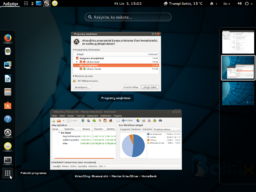Software:Baltix
 Baltix 14.04 screenshot (GNOME Shell) | |
| Developer | Open Source for Lithuania / Mantas Kriaučiūnas |
|---|---|
| OS family | Unix-like |
| Working state | In production / development |
| Source model | Open source |
| Initial release | June 2003 |
| |Final release|Latest release}} | Template:Latest stable software release/Baltix |
| |Final preview|Latest preview}} | Template:Latest preview software release/Baltix |
| Available in | Multilingual (more than 55) |
| Update method | APT (several front-ends available) |
| Package manager | dpkg |
| Platforms | ARM, IA-32, x86-64 |
| Kernel type | Monolithic: Linux |
| Default user interface | GNOME and Unity, in some versions LXDE (previously KDE) |
| License | Free software (mainly GPL). Proprietary software in a non-default area. |
| Official website | baltix |
Baltix is an operating system for Lithuanian and Latvian people, based on Debian and Ubuntu.[1] The main language is Lithuanian.
It uses the GNOME desktop environment (also Ubuntu Unity user interface is included since 2011) and is distributed as an installable Live CD.
The first public versions of Baltix were released in 2003 and were based on Knoppix Live CD and Debian software packages,[2] and later, on the Morphix Live CD framework. Most recently, Ubuntu technology was chosen for Live CD. Despite of changes in startup and installation technologies, Baltix is always distributed as an installable Live CD with graphical installer.[3]
Since 2007 separate Baltix CD/DVD images for home/business use, educational institutions (DVD version for "Science and Education"[4]) and servers are being released.
Baltix can run directly from its live-CD, without installation to a computer's permanent storage (hard disk, solid state drive, etc.), but also can be installed into a computer's Linux or Windows partition(s).
Additional software
Baltix has software packages not included in default Ubuntu CD/DVD images:
- Educational software for kids and adults, including GCompris, TuxPaint, Atomix, etc.
- Parental Control and Content Filtering software GNOME Nanny, Dansguardian-GUI
- Possibility to run software, compiled for Windows OS Wine
- Vector graphic, CAD and diagram drawing software, including Inkscape, QCAD and Dia
- Multimedia software - VLC, Cheese, Pitivi and additional video+audio codecs
- Internet telephony (VOIP) software, compatible with Google Talk - Empathy
- Lightweight Desktop Environment - GNOME-Classic (gnome-panel) and LXDE + PCManFM (older versions had IceWM as lightweight Window Manager)
- Accounting software (HomeBank), Clipart, CAD and office documents templates
- Lots of other packages, which are useful for Lithuanians and other Baltic people, including
- - connections to Lithuanian/Latvian mobile Internet providers and drivers for popular 3G and 4G (Wimax) modems
- - universal dictionary software OpenDict
- - various spelling and hyphenation dictionaries, etc.
Goals
- Easy and right away ready for majority of Lithuanian, Latvian and Russian home/office users (no need to install additionally software for multimedia support or office work, e.g. spelling dictionaries or templates)
- Ability to run software, compiled for Windows OS
- Possibility to work comfortable on older computers (starting from 128MB RAM and 700Mhz CPU), little resources consuming desktop environment is included (currently LXDE)
- Comfortable for computer manufacturers (Baltix 1.x, 2008, 2010, 2012, 2014) have a noninteractive automatic installation (autoinstall) feature - OS can be installed into computer in about 10 minutes without user intervention.[3]
References
- ↑ "Official Baltix website in English". http://baltix.akl.lt/english.
- ↑ "Announce of Baltix-Knoppix". https://lists.akl.lt/pipermail/baltix-knoppix/2003-May/000000.html.
- ↑ 3.0 3.1 Baltix description on official Ubuntu derivative Wiki
- ↑ "Free software for Education and Science". http://mokslui.akl.lt/.
External links
- Official website
- Developers project
- CD/DVD/USB images of the latest and older versions
- CD/DVD/USB images of the latest candidate versions

